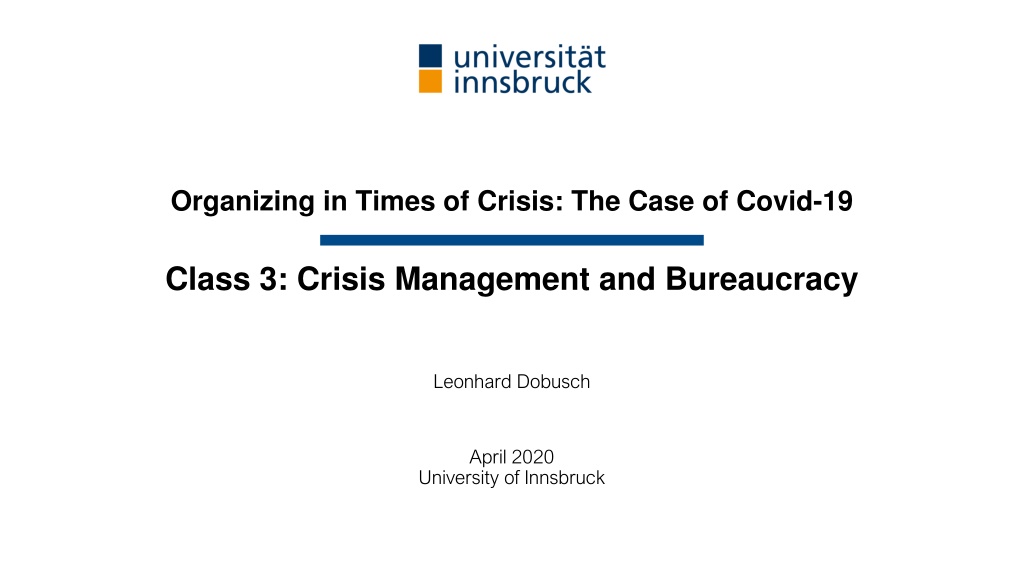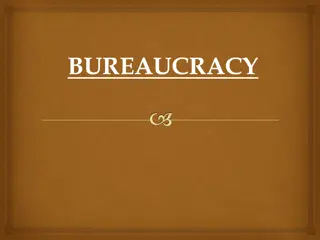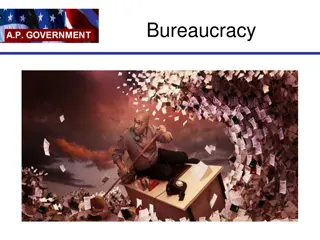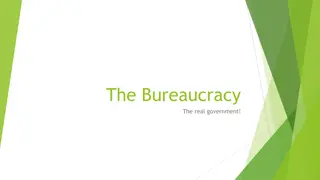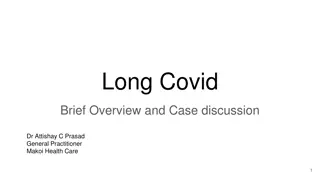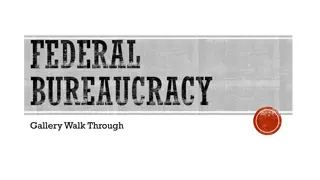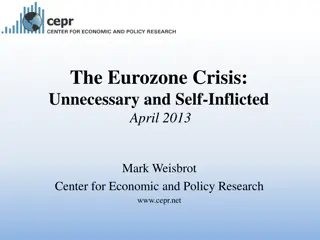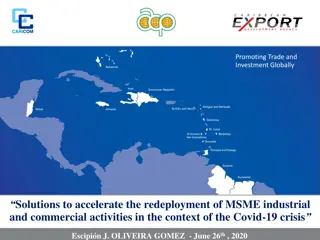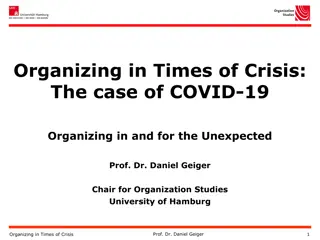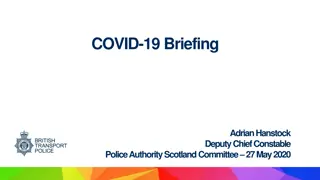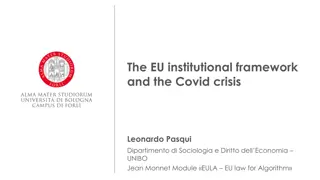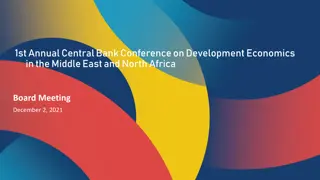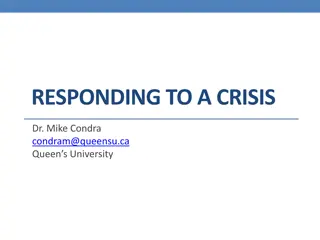Understanding Bureaucracy in Times of Crisis: Lessons from Covid-19
Exploring the role of bureaucracy in crisis management, this study delves into Max Weber's perspective on the precision and stability it offers. It discusses the concept of Weberian Bureaucracy as a modern form of organization, emphasizing hierarchy, specialization, and centralized control. Additionally, it evaluates two contrasting traditions of bureaucracy critique - Entrepreneurial and Ethical perspectives, shedding light on the complexities of bureaucratic systems amid challenges like the Covid-19 pandemic.
Download Presentation

Please find below an Image/Link to download the presentation.
The content on the website is provided AS IS for your information and personal use only. It may not be sold, licensed, or shared on other websites without obtaining consent from the author. Download presentation by click this link. If you encounter any issues during the download, it is possible that the publisher has removed the file from their server.
E N D
Presentation Transcript
Organizing in Times of Crisis: The Case of Covid-19 Class 3: Crisis Management and Bureaucracy Leonhard Dobusch April 2020 University of Innsbruck
[Bureaucracy] is superior to any other form in precision, in stability, in stringency of its discipline and in its reliability . Max Weber (1978, p. 223)
[Bureaucracy] is superior to any other form in precision, in stability, in stringency of its discipline and in its reliability . Max Weber (1978, p. 223)
Weberian Bureaucracy as a Specific Modern Form of Organization Power belongs to an office, not the office holder Authority configuration is specified by formal rules Rules specify tasks for different categories of personnel >> specialization Tendency towards hierarchy Formal credentials certify required qualifications Career: promotion by seniority or merit of service Communication, coordination and control are centralized
Two Traditions of Bureaucracy Critique Entrepreneurial Ethical Tom Peters (cited in Du Gay, 1994) Zygmunt Baumann (1989, p. 15) Credit Baumann photo: Forumlitfest, CC BY 3.0, https://de.wikipedia.org/wiki/Datei:Zigmunt_Bauman_na_20_Forumi_vydavciv(Cr opped).jpg Foto: ShashiBellamkonda, CC-BY 2.0, https://www.flickr.com/photos/drbeachvacation/4644032058
Two Traditions of Bureaucracy Critique Entrepreneurial Ethical the Holocaust is so crucial to our understanding of the modern bureaucratic mode of rationalization ... because it reminds us ... just how formal and ethically blind is the bureaucratic pursuit of efficiency I beg each and everyone of you to develop a public and passionate hatred of bureaucracy Tom Peters (cited in Du Gay, 1994) Zygmunt Baumann (1989, p. 15) Credit Baumann photo: Forumlitfest, CC BY 3.0, https://de.wikipedia.org/wiki/Datei:Zigmunt_Bauman_na_20_Forumi_vydavciv(Cr opped).jpg Foto: ShashiBellamkonda, CC-BY 2.0, https://www.flickr.com/photos/drbeachvacation/4644032058
Entrepreneurial, Ethical and Bureaucratic? Even though we ll end up picking at most two of them, we re going to fund factories for all seven, just so that we don t waste time in serially saying, OK, which vaccine works? and then building the factory. Bill Gates Screenshot: https://www.businessinsider.com.au/bill-gates-factories-7-different-vaccines-to-fight-coronavirus-2020-4
The Democratic Case for Public Bureaucracy (1) Proviso of the law: no administrative action may take place without a legal, democratic basis >> formally codified rules, prohibition of arbitrary action (2) Equality before the law: individuals must be treated equally by the law >> predictability, stability (3) Rational legal authority: individualactions of public officials follow a clear chain of command >> tendency towards hierarchy; roles, not persons
Public Bureaucracy vs. New Public Management (3) Rational legal authority } (1) Proviso of the law (2) Equality before the law Ideal-typical qualities of public administrations The basic rationale behind NSM is an increase in efficiency by utilizing the mechanisms of business-like performance management, while at the same time stepping up the decentralization and autonomy of local governments NEW PUBLIC MANAGEMENT Vogel (2012, p. 370)
Public Bureaucracy vs. New Public Management BUREAUCRATI C MANAGERIAL Focus on reliability and legality, mainly pursued by means of input and process control Focus on efficiency, mainly pursued by means of output control
Public Bureaucracy vs. Open Government (3) Rational legal authority } (1) Proviso of the law (2) Equality before the law Ideal-typical qualities of public administrations a more democratic, collaborative, and transparent administration through public access to data, deliberations, and decisions OPEN GOVERNMENT Kornberger et al. (2017, p. 180)
Public Bureaucracy: More Managerial and More Open? PUBLIC BUREAUCRACY More in Class 8: Open Science, Data and Commons NEW PUBLIC MANAGEMENT Entrepreneurial OPEN GOVERNMENT Ethical
Contact E-Mail: Leonhard.Dobusch@uibk.ac.at Twitter: @leonidobusch Web: bit.ly/LD-UIBK // dobusch.net Research blogs: osconjunction.net governancexborders.com
References Baumann, Z. (1989). Modernity after the Holocaust. Cambridge: Polity Press. Du Gay, P. (1994). Making up managers: bureaucracy, enterprise and the liberal art of separation. British journal of Sociology, 655-674. Kornberger, M., Meyer, R. E., Brandtner, C., & H llerer, M. A. (2017). When bureaucracy meets the crowd: Studying open government in the Vienna City Administration. Organization Studies, 38(2), 179-200. Vogel, R. (2012). Framing and counter framing new public management: The case of Germany. Public Administration, 90(2), 370-392. Weber, M. (1978). Economy and society: An outline of interpretive sociology (Vol. 1). Univ of California Press. 15
